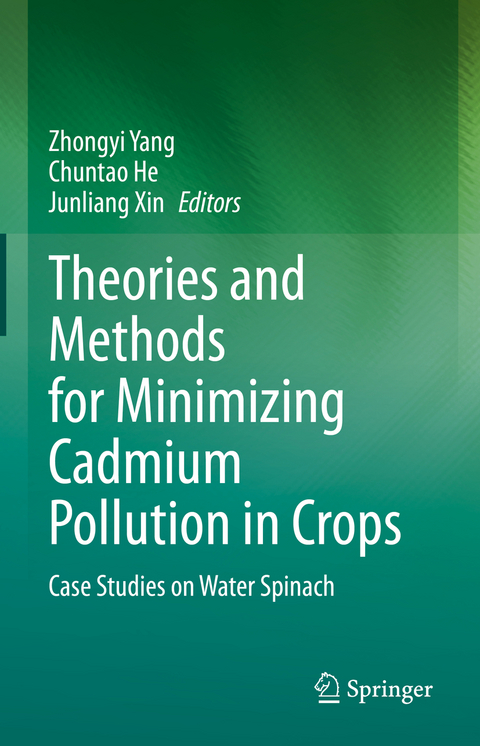
Theories and Methods for Minimizing Cadmium Pollution in Crops
Springer Verlag, Singapore
978-981-16-7750-2 (ISBN)
Dr. Zhongyi Yang is the professor of ecology and environmental science in School of Life Sciences, Sun Yat-sen University, China. He received his Ph.D degree in 1988 from Tohoku University, Japan. As an experienced reviewer for over 20 peer-reviewed international journals, he has kept in pace with the frontiers of environmental and ecology science. His research interests mainly involve in methods of ecological agriculture, heavy metal accumulation pattern in crops, ecology toxicology, environmental education, and low carbon development. He has proposed the concept of pollution-safe cultivars as the strategy to minimize heavy metal pollution in crops and investigated the Cd pollution-safe cultivars of leafy vegetables and the chemical and molecular mechanisms of cultivar-dependent Cd accumulation for nearly 20 years. Dr. Chuntao He is the associate professor of ecology in School of Agriculture, Sun Yat-sen University, China. She received her Ph.D degreein environmental science from Sun Yat-sen University, Guangzhou, China in 2016. Her research interest broadly lies in the fields of applied ecology such as pollutant behavior in ecosystem, safe production of agriculture, and ways for green development. In recent years, she has focused on the breeding of Cd pollution-safe cultivar through the physiology, biochemical, molecular biology, and bioinformatic techniques. Dr. Junliang Xin is professor of environmental science in School of Chemical and Environmental Engineering, Hunan Institute of Technology, Hengyang, China. He received his Ph.D degree in environmental science from Sun Yat-sen University, Guangzhou, China in 2010. He is a reviewer for more than 20 peer-reviewed international journals and a member of the Chinese Society for Environmental Sciences. His research interests include physiological, biochemical, and molecular biological mechanisms in crops under cadmium exposure; phytoremediation; constructed wetland for wastewater treatment; remediation of heavy metal contaminated soil. Recently, his work has focused on minimizing cadmium accumulation in rice and vegetables grown in cadmium contaminated soil. His group investigates the mechanisms of different amendments and fertilizers in reducing cadmium accumulation in crops, and the effectiveness of boron removal by plant-based wetlands and floating islands.
Chapter 1. Cadmium Contamination in Agricultural Soils and Crops.- Chapter 2. Intraspecific Variations in Cadmium Accumulation Capacity of Crops and Application of Pollution-safe Cultivar.- Chapter 3. Cultivar-dependent Cadmium Uptake and Translocation of Water Spinach and Its Stability.- Chapter 4. The Effects of Rhizosphere Properties on Shoot Cd Accumulation of Water Spinach.- Chapter 5. A Decisive Role of Roots on Shoot Cd Accumulation of Water Spinach.- Chapter 6. Subcellular and Chemical Mechanisms Affecting the Cultivar-dependent Cd Accumulation of Ipomoea aquatica Forsk.- Chapter 7. Breeding of New Cultivar of Water Spinach with Low Shoot Cd and Pb Accumulations.- Chapter 8. Differences of Cd-induced Gene Expressions between Low- and High-Cd Accumulating Cultivars of Water Spinach: a Case Using Suppression Subtractive Hybridization (SSH) Method.- Chapter 9. Comparative Transcriptome and MicroRNAs Analyses between Low- and High-Cd Accumulating Cultivars of Water Spinach.-Chapter 10. Perspectives on the Marker-assisted Breeding of the Cd-PSCs.
| Erscheinungsdatum | 03.05.2022 |
|---|---|
| Zusatzinfo | 1 Illustrations, black and white; XVII, 211 p. 1 illus. |
| Verlagsort | Singapore |
| Sprache | englisch |
| Maße | 155 x 235 mm |
| Themenwelt | Naturwissenschaften ► Biologie ► Botanik |
| Weitere Fachgebiete ► Land- / Forstwirtschaft / Fischerei | |
| Schlagworte | Biochemical and molecular mechanisms • Cadmium • Cd induced-miRNA regulation • Cd induced-transcriptomic profile • Cultivar-dependent variation • Food Safety • Heavy metal contaminated soils • marker-assisted breeding • Pollution-safe cultivar • water spinach |
| ISBN-10 | 981-16-7750-6 / 9811677506 |
| ISBN-13 | 978-981-16-7750-2 / 9789811677502 |
| Zustand | Neuware |
| Informationen gemäß Produktsicherheitsverordnung (GPSR) | |
| Haben Sie eine Frage zum Produkt? |
aus dem Bereich


